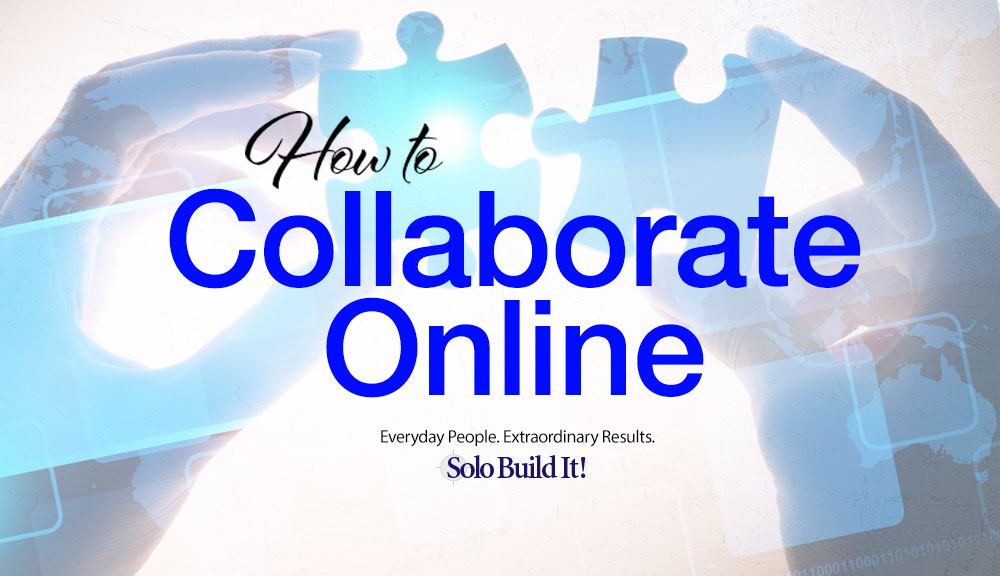
The hot talk these days is about Instagram’s new Collab feature, but collaborations were an important aspect of growing a business long before Instagram and its (in)famous influencer culture came along.
There are many ways of collaborating with others in your niche to benefit your business.
I run a successful content marketing website in the health arena. Since the Google Medic algorithm caused a traffic drop in October 2018, I’ve reached out and collaborated with many experts in my field. I believe that, along with other best practice online business techniques, it has helped my traffic grow.
This article will share some of my experiences and help you learn how to do collaborations and become a valuable business collab partner!
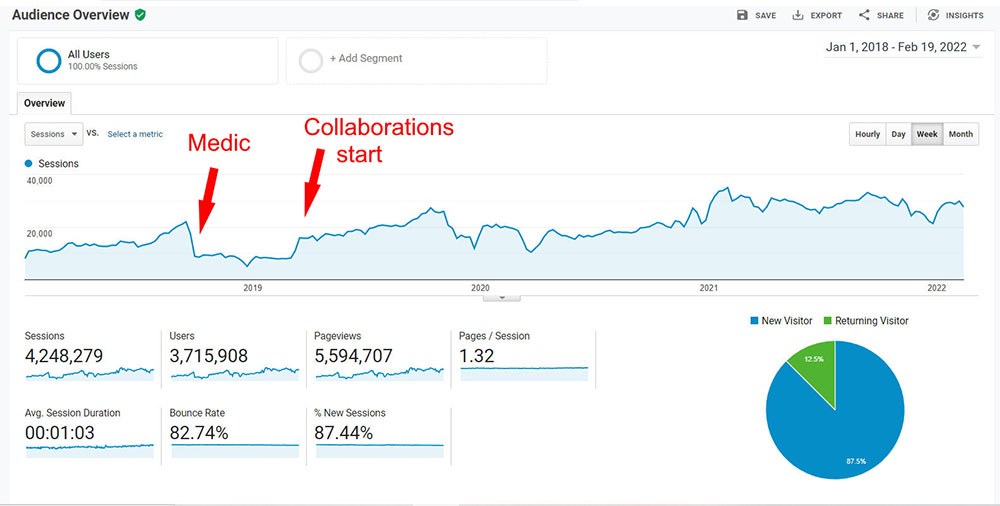
4 Reasons Why Collaboration Is Important
- Endorsement and credibility – Here’s a great piece of advice from Dr Ken Evoy, creator of Solo Build It!, the platform I use to build my websites: “If you can’t demonstrate your own expertise to Google, associate with those who can.” This is particularly important in the health niche. If you’re a lay person, it’s essential to have your high quality content endorsed or reviewed by qualified experts.
- Exchange of resources – maybe you have traffic, but no product to promote, or the reverse. You have a fantastic product or book to promote but haven’t built up followers on social media or an email list. Learning how to do collaborations with in those scenarios can be the difference in a make or break situation.
- Exchange of ideas – let’s face it, we can’t always be experts in every single aspect of our niche. Sharing ideas and swapping expertise are great ways of keeping your content fresh, up to date and comprehensive.
- Google ranking – no one knows for sure all the ranking signals Google uses, but you can bet that having articles by well-known published experts on your site will help.Mentions in social media by folks with huge numbers of followers can’t do you any harm either. I’m fairly certain that a mention I got on Facebook by a well-known author in my niche helped my recovery from the Medic algorithm.Her book had just appeared in Oprah’s 10 Best Books, so her credibility was riding high at the time. Farther down this article, you can read about how I reached out to her.
Work Out Your Collaboration Goals
Work out your collaboration objectives before you choose what sort of business alliance you need. In order to learn how to do collaborations well, you need goals.
If you’re not entirely sure why you’re reaching out and what you want, you won’t know whether or not your efforts have been successful.
My goals in inviting collaborators were:
- demonstrate credibility and expertise
- reach and help more people
- create more content
- increase revenue
Other goals you may have could be:
- boost social media growth
- get endorsements for a product
- get book reviews
- get more traffic to your blog or website
Work Out What You Have to Give
To be the perfect collaboration partner for another business, and to reach some of your own goals, you’re going to need something to offer them.
Let’s face it, we rarely get something for nothing in this life!
Here are a few things that you might be able to offer:
- traffic
- mentions on social media
- exposure to your email list
- an article on your website
- promotion of their product
- a review of their book
Try to think outside the box. There must be many other ways your business can offer value to someone else.
Be upfront about what you can give, and have clear goals about what you want out of the deal. If you can see benefits on both sides, then go for it.

Types of Collaboration
These are the types of collaborations that I have tried:
- Guest blogging
- Co-authoring
- Reviews
- Research
- Interviews
I’m sure there are many more. Think creatively and come up with what works for your business. Of course, there are now Instagram Collabs too!
How to Find the Best Collaborators
- Follow movers and shakers in your niche on YouTube, Facebook, Instagram, LinkedIn, wherever they may hang out.
- Join groups about your niche.
- Join professional associations and organizations.
- Look for the authors of the best books in your niche.
- Which websites are number one for your most important keywords? Who are the people behind those sites?
- In health or scientific niches, look for interesting peer-reviewed journal articles about topics that fit with your site. You can find scientific papers by searching on Google Scholar. Contact the authors and ask if you can interview them or write an article about their research.
How to Start Collaborations With the People You Found
Before you invite a collaborator, read their books and articles. Attend their events and talks. Make sure you’re knowledgeable about them before reaching out.
Show that you’re for real and are genuinely interested in their work by responding online to their activities. Only then should you introduce yourself and ask if they’d like to collaborate.
Write a heartfelt, meaningful letter that references their work and makes it clear that you have taken time to study them. Be clear about what you would like them to do. Perhaps give them some options. Also add what you can bring to the relationship.
Collaborations to Avoid!
Once you’re visible online, you’ll receive a lot of requests for collaboration.
Sadly, most of these are just time-wasters. Many come from marketing companies asking to put a guest post on your site. Usually they send a standard letter and haven’t even looked at your website or business.
If you ask them for an example of their writing or to which website they wish to link, you’ll generally get no reply. If they do let you know what they’re promoting, it’ll often be something totally irrelevant to your niche, or pretty low quality.
Similarly, if you specify you will only give a “nofollow” link they’ll lose interest. (Google guidelines state that you must not give a “do-follow” link if you have received any form of payment for the blog post.)
Don’t be tempted by the lure of easy content in return for linking to anything dubious or irrelevant. It just won’t be worth it. The content is likely to be substandard, and it won’t do your Google rankings any good.
There are some exceptions though, as you’ll see below, so it pays to keep an open mind and not write off anyone straight away.
My Experiences of How to Do Collaborations
With my mother, I run a website that helps people with grief. She was the original writer and I am the editor and web developer.
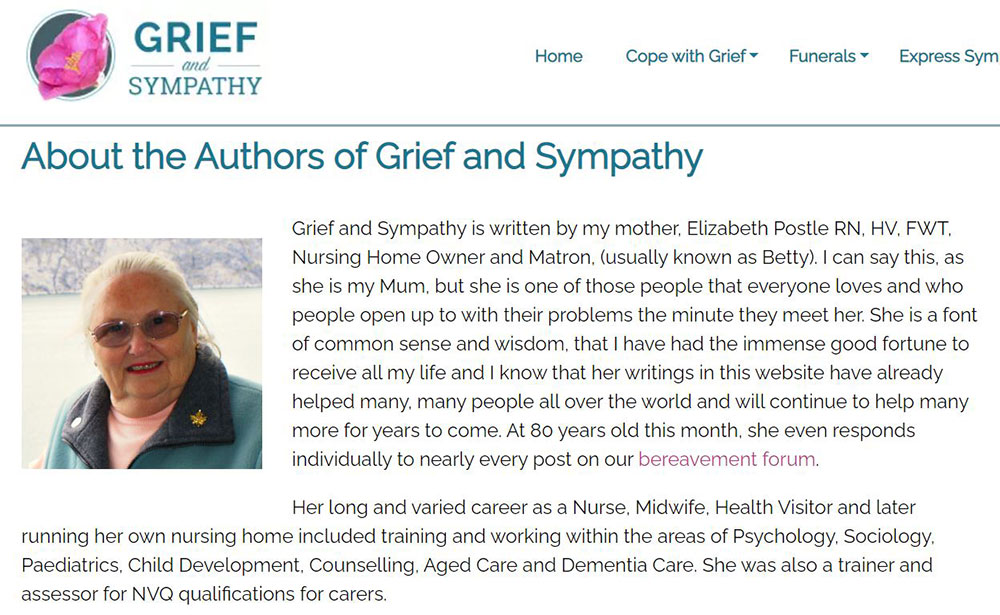
Judging by our drop in traffic immediately after the Medic algorithm update, which was intended to devalue unreliable health websites, my Mum’s 45 years of experience as a nurse were perhaps not good enough for Google.
So we needed guest articles from health professionals who have psychology PhDs and have published peer-reviewed articles in medical journals and books. This would demonstrate to Google that we were a bona-fide website with which published experts were happy to be associated.
I’m as bad as the next person at networking. I procrastinated about it a lot, but I started trying to reach out and gradually learned what worked and what didn’t.
Book Review
The first person I contacted when learning how to do collaborations was the author I mentioned above, whose book had been on Oprah’s Top 10 Books, Dr Joanne Cacciatore. I didn’t know that at the time or I might have been scared off!
I had come across some of her articles and research and loved her mindfulness approach. She was a researcher, ran a university department and a grief retreat on her farm, and had just published her book. I let her know what I had read of her work, asked if she could write something for me, and if I could have a review copy of her book.
Her heartfelt and warm response was such an uplift to me that it blew my mind. She said she was too busy to write anything, but was happy to send me a book.
So I responded with thanks and asked if she minded me writing a profile of her and her work and whether I could send it to her for approval before publishing it.
When I got the book, I was totally blown away by her writing, which was extraordinarily beautiful and moving. It remains to this day the best book on grief I’ve ever read.
I wanted to sprinkle my content with quotes from her book, they were so expressive. At that point I found out just how successful her book was.
In the end, I wrote a profile of Joanne and a review of her book. She was delighted and flattered by both of them and shared them on all her social media.
In addition to that, I believe that the pages and her book are of great value to my readers.
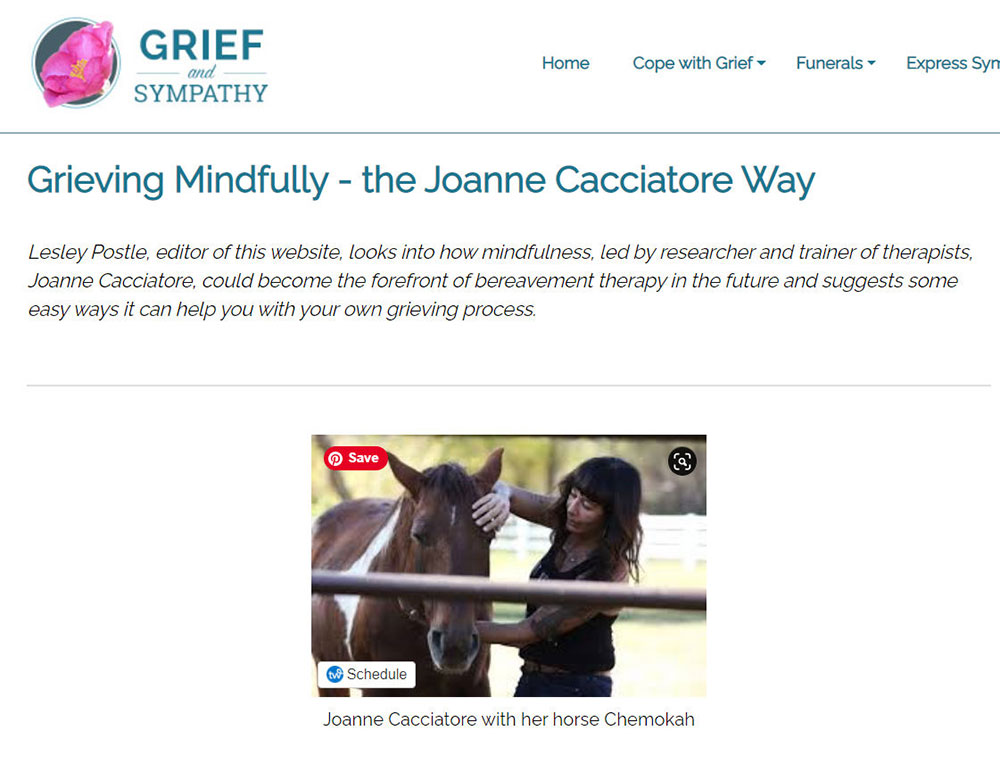
I didn’t expect to get a response to my email to her but I’m so glad I tried anyway.
The lesson to be learned from this one is to keep it real. Only share the products, books and philosophies of people whom you really admire and who will add value to your business. Choose people you know your customers/clients/readers will love too.
Be prepared to share the work of these people even if you don’t get anything back, simply because you think they’re worth it.
Don’t be afraid to reach out from the heart and be genuine. That way, the magic will happen.
Lots More Collaborations Followed
Joanne’s lovely response gave me a lot of confidence and motivated me to keep going.
I joined the Australian Centre for Grief and Bereavement and attended a couple of webinars. Then I attended an online grief conference, which I only found out about through the webinars. (Once you get the ball rolling it seems to keep rolling.)
Through those activities I managed to get articles from several people with psychology PhDs who are experts and authors in specific grief fields. I also did an interview with a professor who is an expert in grief for missing persons.
Currently I’m working with a wonderful woman in her eighties who has written a book on Expressive Arts Therapy. She wrote me a moving article about how art helped with the loss of her mother.
Co-authoring
I’ve now done a few co-authored articles on my website. The first time, I searched on Google Scholar for peer-reviewed research papers about online grief support groups. I reached out to a researcher in this field who had published a paper. I asked if she’d like to collaborate on an article to bring her findings to a lay audience.
She was happy to do that. It took a long time, with life getting in the way on both sides, but eventually, we produced a joint article explaining her work. It was good to get her name on the website as a published expert in the field.
To be honest, she probably felt like she wasn’t getting much out of the deal except to be flattered someone had taken notice of her work. That’s probably why it took so long.
Collaborations to Benefit Research Projects
The next time I reached out to researchers, it was after seeing a webinar by a professor from the USA. I watched her talk and then wrote, asking if she’d like to collaborate with me.
I offered to put ads and surveys on my website to recruit participants for her research. She and her colleague were very interested and asked for a Zoom call.
It was great to meet them and form a working relationship. Having an ad for their university research along with their logo on my website helps us to demonstrate that our site is a highly regarded, professional resource.

I also recruited for them through our social media and email contacts.
It’s a great ongoing relationship. They benefit from our traffic and use the results of their research to help grievers in the real world by writing about it on our site.
We, in return, get the prestige of having articles by highly qualified experts, which may help with our Google rankings. At the very least, it gives us credibility and brings up-to-date and reliable content to our readers.
One of their research topics is grief journaling. With them I created a series of articles incorporating their latest research into its benefits and the best way to do it.
What happened next was amazing and shows the power of communicating to your readers via an email list.
I mentioned in one of my mailouts that I was about to publish a section on grief journaling. The next day a grief therapist from the UK, who had been journaling for 20 years, reached out to me. She had seen my mailout and wanted to send me some of her writing. She was also learning how to do collaborations, had never been published and wanted to see if she could get her work online.
She was asking nothing from me except the chance to be seen and gain confidence. Her writing and expertise in the field of grief journaling were exceptional.
Her addition to my grief journaling section was fabulous and rounded it off perfectly. We’re now working together on another project.
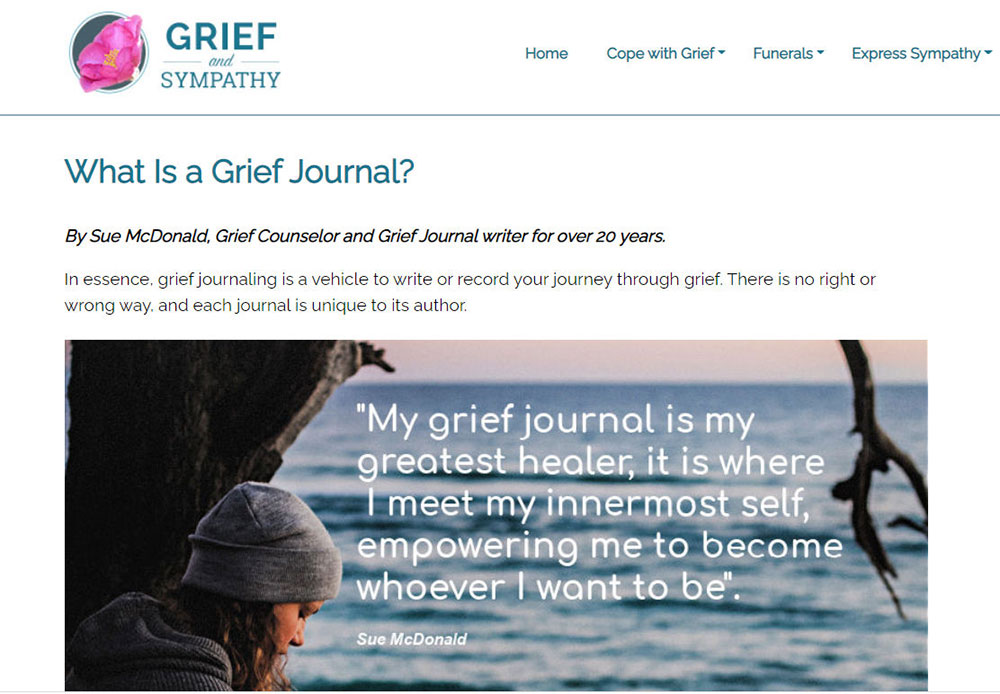
Guest Blogging
Guest blogging is where you write an article for someone else’s website in order to get your name out there, and maybe a link back. I tried to write articles for various other websites in the past without much success. It’s time-consuming, and you can wait months and get no response.
Getting quality articles for your own website, ones that don’t require you linking to dubious or irrelevant material, is difficult too.
However, as I say, there are exceptions. A while back I received an email from a new online counseling company. They asked if I would be willing to publish articles from some of their counselors. They only asked for a link to the counselor’s biography on their website, which I was happy to do.
These were highly qualified grief counselors — exactly the people I’d want to write for my website. I published five or six excellent articles on topics that we had not covered before.
Interviews
Interviews are one of the easiest ways to form collaborations, even if you have to do them on Zoom and transcribe them yourself.
You could even publish the interview on video too. People are much more likely to agree to an interview than to write an article, but you can still end up with a website page.
I like to send the questions in writing. If they reply in writing, I have more of the work done. If I interview them in person, they’ve had time to think about the questions and come up with some great answers.
You’ll need to have done your homework on the person before the interview so you can tailor it exactly to their area of expertise.
5 Final Tips For How To Do Collaborations
- Be prepared to put in most of the work, especially if the other party is an expert or highly regarded in their field. Make the article an interview, or create a first draft to make it easy for them. Otherwise most busy people just won’t get around to it.
- Be specific about what you want. I’ve found that if I ask people to write an article about grief for me, and leave it open, I get nowhere. They might agree but it never happens as it’s too vague and gets put in the “too hard” basket. This is particularly true in my niche because grief is such an emotional topic for anyone to write about.
- Take notes of a lecture and turn them into an article. That’s another approach I tried recently, which worked well. I listened to a lecture given by someone at an online conference. I made notes, and then wrote to the presenter, saying that I thought her excellent talk would make a great article and would she like to collaborate with me on it. (Flattery gets you everywhere!)
I suggested that I’d edit my notes, send them to her as a draft, and she could comment and add a couple of case studies. She was very happy to do that.
- Work out what makes you the perfect collaboration partner. Don’t be afraid of selling yourself and what you have to offer. Shine a light on your assets. Traffic, social media followers, email list, space on your website, etc.
- Let people know you can link to their site, their books or their papers. If you have good traffic, let them know. Many experts have publications and books, but don’t have any traffic or a way of getting their message out to a wider audience. Many appreciate being able to do that with your help.

The Most Important Tip for Collaborating Well
Be authentic and make sure your approach comes from the heart. However intimidated you might feel by the person you’re contacting, who may be a big name, or has written a lot of books or published papers — remember, this is a real person with real life challenges just like you.
I had a big reminder of this a while back.
I was searching for someone to write an article on sibling grief for me. I found a psychology professor who has published a lot on the topic and also lost two sisters. Her website was excellent, and she has written successful books and papers.
My initial thought was, she’s too important and probably really busy, she won’t want to write for us, but perhaps I can persuade her to be interviewed. I decided to have a go, and then looked at her Facebook page.
It turned out she was suffering from cancer and was very sick. I was so moved by the video she had just posted, which was raw and honest and sharing her vulnerability, that I decided to reach out anyway.
She had said in her video that after fighting cancer for a year, she was having problems believing that she still mattered. So I messaged her, told her how I’d found her, that her contribution to the grief literature was incredible, and that I was inspired by her bravery in sharing her cancer journey.
I also shared that I had someone in my life with cancer too. She was touched by my message and said that she would like to write an article for us.
To be honest, even though I never got the article, it was such a profound and beautiful connection to have made.
I’m really glad I reached out. I also learned an important lesson:
You never know what life will give you unless you put yourself out there.



Latest posts by Lesley Postle (see all)
- Pros and Cons of Using Zazzle: A Seller’s Guide to Success - May 23, 2024
- Working From Home With Chronic Illness: 10 Proven Tips - August 25, 2022
- How I Thrived When Forced to Quit My Job Due to Chronic Illness - August 4, 2022

